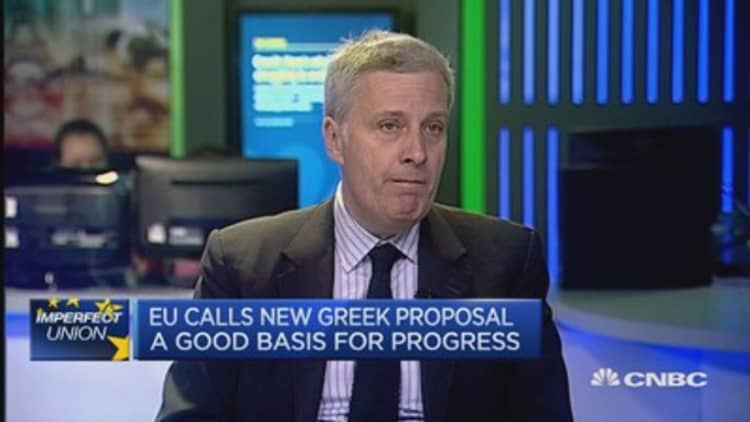
Global markets cheered on Monday, as Greece made a last-ditch offer to its creditors in a desperate effort to avoid defaulting on its debt.
Concerns over Greece have plagued markets for months. The country has warned it would be unable to pay a 1.5-billion-euro ($1.7 billion) bill to the International Monetary Fund (IMF) at the end of the month without further financial aid – something its creditors have refused to release without a firm commitment to additional fiscal reforms.
Over the weekend, however, Greek Prime Minister Alexis Tsipras submitted new proposals ahead of crisis talks in Brussels on Monday with the heads of the bodies overseeing its bailout – the European Commission, European Central Bank and IMF.
Hopes of some agreement between the two parties were high, with European equity markets closing sharply higher on Monday. Both the French CAC and German DAX ended the day up around 3.8 percent.
It comes as the head of the Eurogroup of euro zone finance ministers, Jeroen Dijsselbloem, said he hoped to reach a deal with Greece later this week. The pan-European Stoxx 600 index closed around 2.3 percent higher after the comments.
"While the sudden ramping up of diplomacy suggests that we might well see progress on technical details today, we would not expect to see a full deal concluded," Chris Scicluna, head of economic research, at Daiwa Capital Markets, said in a note on Monday.
"That might well have to wait for the further summit of EU heads of state and government scheduled for Thursday and Friday. Moreover, even if and when a deal is signed, the ratification of any such deal in national legislatures – in Greece and elsewhere – would seem highly unlikely to be plain sailing."
Read MoreKey actors to take stake in Greek drama in week ahead
Perhaps unsurprisingly, the Athens stock exchange was the strongest performing index in Europe, closing 9 percent higher on Monday.
Greek banks, which have been hit especially hard by massive outflows, were the big winners, with both Alpha Bank and Bank of Piraeus closing over 20 percent higher. Withdrawals remain in focus, however, after deposit outflows spiked to more than 4 billion euros ($4.5 billion) last week, according to Reuters, and an additional 1 billion euros is expected to be withdrawn on Monday.
Across the Atlantic, meanwhile, American investors also appeared to be in an optimistic mood. U.S. stocks were trading higher around the Europe close, after the Dow Jones Industrial Average started the day up over 100 points.
Euro surprise?
On currency markets, however, things looked a little different, with the euro experiencing something of a bumpy morning. By the end of play London, the euro had managed to edge up 0.27 percent against the dollar after spending much of the day in the red.
Jane Foley, senior currency strategist at Rabobank, explained why she thought the euro had fallen early Monday: "It was probably lower for the same reason that stock markets are higher."
She pointed out that the euro had been well supported over recent weeks, despite stock markets falling in the face of Greek uncertainty.
Read MoreGrexit: Here's what Europe is struggling to avoid
"There has been some quasi-safe-haven behaviour in the euro – a function of the euro zone's current account surplus – and money has come back into the single currency because of fears about Greece," she added.
"If that's right then it makes sense that it should be (negatively) correlated with the stock market in this way."


